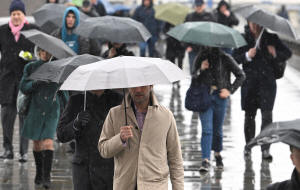UK pay growth slows as Bank of England mulls rates pause
 Send a link to a friend
Send a link to a friend
 [March 14, 2023] By
William Schomberg and Sachin Ravikumar [March 14, 2023] By
William Schomberg and Sachin Ravikumar
LONDON (Reuters) - Growth in pay in Britain - which the Bank of England
is watching closely as it weighs up whether to pause its run of interest
rate hikes next week - lost pace in the three months to January,
official data showed on Tuesday.
Basic pay, excluding bonuses, rose by 6.5% compared with 6.7% in the
three months to December, representing the first slowdown in the that
measure since late 2021.
Total pay grew by an annual 5.7% in the November-to-January period,
slowing from 6.0% in the previous figures and the weakest increase since
the three months to July last year, the Office for National Statistics
said.
Economists polled by Reuters had expected basic and total earnings to
rise by 6.6% and 5.7% respectively.
Britain's unemployment rate held at 3.7% in the three months to January,
close to its lowest in almost five decades, the data also showed.
Economists polled by Reuters had mostly expected the rate to rise to
3.8%.

The BoE is expected to raise borrowing costs on March 23 by a further
quarter of a percentage point to 4.25% although investors have cut their
bets on such a move sharply after the collapse of U.S. lender Silicon
Valley Bank.
Interest rate futures showed investors were putting the chance of the
BoE pausing its rate hikes next week at about 40% at 0830 GMT while a
quarter of a percentage point increase in borrowing costs was seen as a
60% possibility.
Yael Selfin, chief economist at KPMG UK, said while the ONS data showed
a slowing of pay growth, more recent measures showed little change
recently.
"Coupled with stronger-than-expected GDP data, this should provide
enough evidence for the Bank to raise rates when it meets next week,"
Selfin said.
But Martin Beck, with forecasters the EY ITEM Club, said a BoE rates
pause was now likely after 10 back-to-back hikes.
[to top of second column] |

Workers cross London Bridge during the
morning rush hour in London, Britain, March 10, 2023. REUTERS/Toby
Melville

"These moves follow other developments, including an unexpectedly
significant decline in the services sector inflation in January,"
Beck said.
Sterling rose against the dollar and the euro shortly after the data
before falling back.
Finance minister Jeremy Hunt is expected to announce measures in his
budget statement on Wednesday that will seek to get more people into
work, easing the inflationary pressure in the labour market.
"The jobs market remains strong, but inflation remains too high,"
finance minister Jeremy Hunt said after the data was published, a
day ahead of his budget speech.
"Tomorrow at the budget, I will set out how we will go further to
bear down on inflation, reduce debt and grow the economy, including
by helping more people back into work."
Tuesday's data showed earnings were further diminished by an
inflation rate that stood above 10% in January.
The ONS said basic pay, when adjusted for inflation using the
consumer prices index, fell by 3.5%, one of the largest falls since
records began in 2001. Total pay fell by 4.4% in real terms, the
biggest drop since early 2009.
There were some signs of a further easing of the tightness in the
labour market with the economic inactivity rate - measuring people
out of work and not looking for it - falling by 0.2 percentage
points to 21.3%, driven mostly by young people.
Vacancies decreased for the eighth time in a row in the three months
to February, falling by 51,000 from the previous three months to
1.124 million.
(Graphic by Sumanta Sen; Editing by Kate Holton and Christina
Fincher)
[© 2023 Thomson Reuters. All rights
reserved.]
This material may not be published,
broadcast, rewritten or redistributed.
Thompson Reuters is solely responsible for this content.
 |